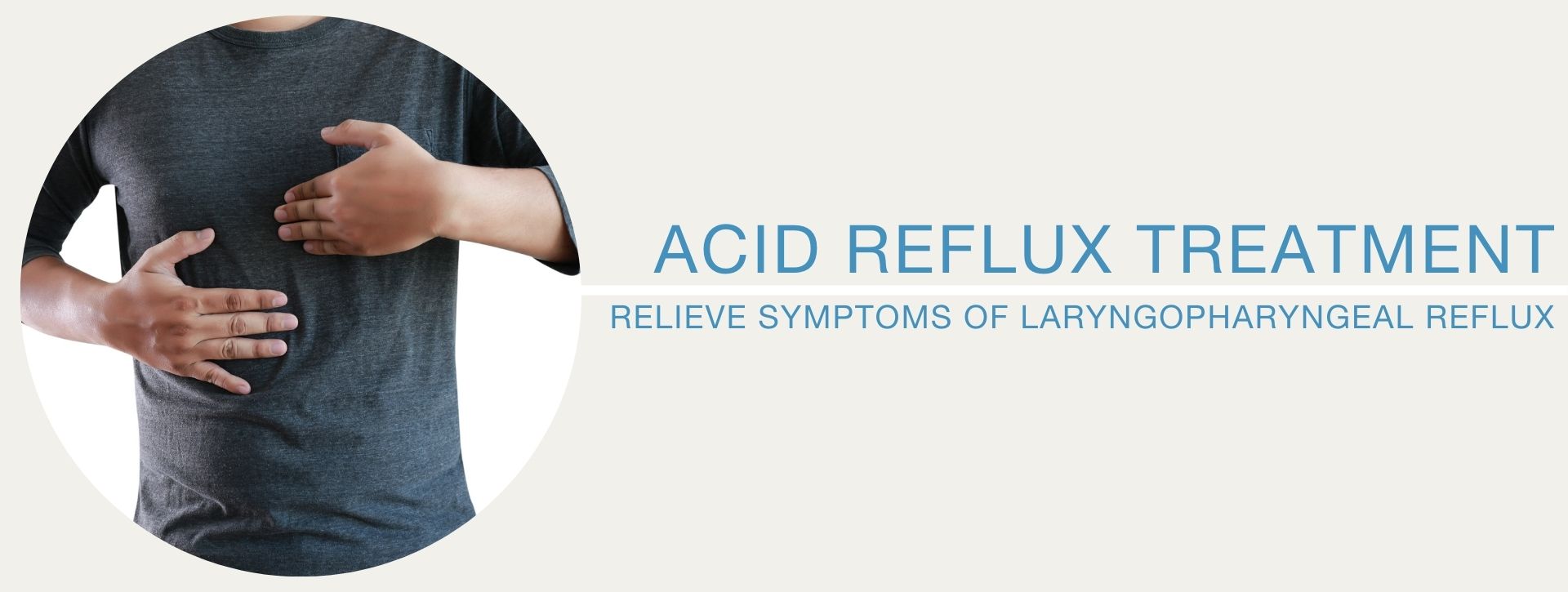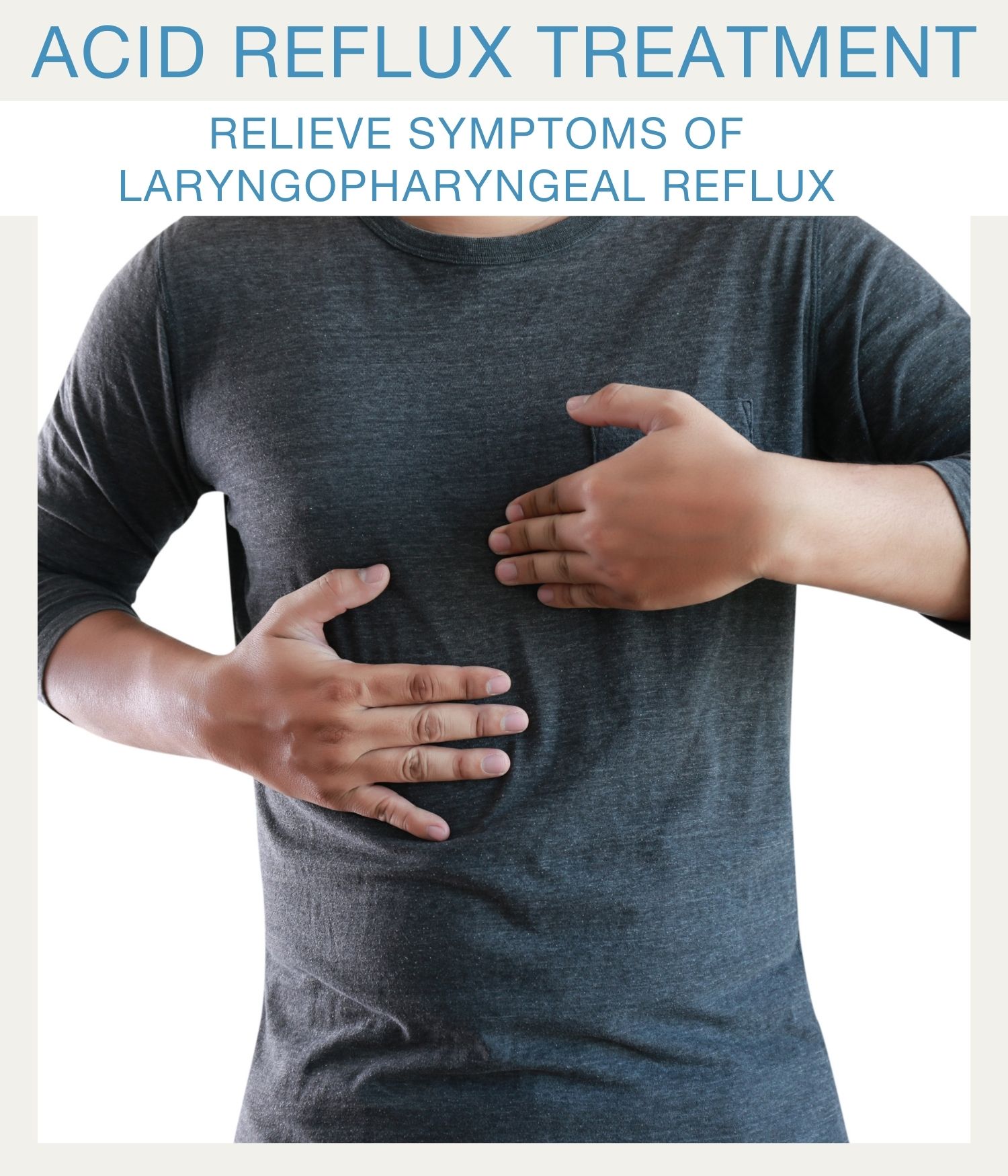

Schedule a Consultation
By submitting this form you agree to be contacted via phone/text/email.
LARYNGOPHARYNGEAL REFLUX (LPR) | TREATMENTS FOR SILENT REFLUX & HOARSENESS
Laryngopharyngeal reflux (LPR,) also known as “silent reflux,” is a type of acid reflux that inflames the vocal cords. LPR symptoms include hoarseness, feeling a lump in your throat, and an excessive need to clear your throat. Continue reading to learn more about LPR. Discover the causes, symptoms, and treatments for silent reflux.
WHAT IS ACID REFLUX?
The stomach contains acids and enzymes that break down food for digestion. A valve-like muscle, called a sphincter, regulates the flow of contents in and out of the stomach. The sphincter opens when we swallow food. It then closes to keep gastric contents from flowing up into the esophagus (the swallowing tube that connects the throat to the stomach.)
Sometimes the sphincter does not perform properly, allowing acidic stomach contents to travel up into the esophagus. This is known as acid reflux.
There are two types of acid reflux. When the backward flow of acidic contents inflames the esophagus, it is known as gastroesophageal reflux disease (GERD.) The classic symptoms of GERD include heartburn and indigestion.
Sometimes, acidic contents flow up the esophagus and spill into the pharynx (throat) or larynx (voice box,) inflaming those tissue. This is known as laryngopharyngeal reflux (LPR). The classic symptoms of LPR include hoarseness and a sensation of a lump in your throat.
SYMPTOMS
With LPR, the vocal cords become inflamed and damaged. This can lead to a variety of symptoms, including:
- Hoarseness
- Increased phlegm or mucus in the throat
- A sensation of a lump in the throat
- Excessive throat clearing
- Cough
- Sore or burning throat
- Sour or bitter taste in the mouth
These symptoms are typically worse in the morning and after eating food (especially spicy food).
Interestingly, individuals suffering from LPR typically lack the classic symptoms associated with GERD, namely heartburn.
HOW IS LPR DIAGNOSED?
Your doctor from the Ear, Nose, & Throat Center will take a complete medical history to diagnose your LPR accurately. This history covers your symptoms, their severity, and behaviors that may cause or exacerbate your reflux. Other diagnostic tests may include:
- Esophagram (an X-ray of the esophagus)
- Nasal endoscope (a small tube fitted with a camera at the end.)
- Laryngoscopy (A laryngoscopy uses an endoscope, inserted through the nose, to access a magnified view of the larynx.)
- pH probe to monitor the rate of reflux backflow.
Not all hoarseness is caused by LPR. If your voice does not improve or resolve within 4 weeks of treatment or if your doctor suspects any other serious underlying conditions, a laryngoscopy should be performed to rule out rare but serious causes of hoarseness.
LPR + HOARSENESS TREATMENTS
At the Ear, Nose, & Throat Center, LPR treatments are individually curated to the patient’s unique needs and situation. Most treatment plans incorporate lifestyle modifications, dietary changes, and acid reflux medications.
LIFESTYLE & BEHAVIORAL MODIFICATIONS
Numerous behaviors contribute to or worsen acid reflux. The first line of treatment for LPR involves modifying these behaviors.
Suggested modifications may include:
- Avoiding tobacco
- Avoiding alcohol
- Following a specific diet
- Losing weight
- Wearing loser clothing
DIET
The food we eat and the way we eat it impacts the severity of acid reflux. Your doctor from the Ear, Nose, & Throat Center will customize a diet plan that includes foods to avoid, nutritional recommendations, and modifying when and how you eat.
Foods to Avoid
Your ENT may suggest cutting back on foods that acerbate acid reflux symptoms or weaken the esophageal sphincter. These include:
- Drinks with caffeine and alcohol. These may weaken the esophageal sphincter, permitting the backward movement of stomach contents.
- Carbonated drinks. These cause belching, which brings acidic contents into the esophagus.
- Acidic foods such as citrus fruits, tomatoes, and spicy foods.
Dietary Behavioral Modifications
How you eat and when you eat can also exacerbate acid reflux symptoms. Therefore, your doctor may suggest you:
- Avoid eating late at night or laying down for at least three to four hours after eating.
- When you do sleep, elevate your head using an extra pillow.
- Eat smaller meals spread throughout the day.
Nutritional recommendations
The “silent reflux diet” is a balanced diet high in vegetables, lean proteins, and fiber. These may include:
- Leafy Greens
- Legumes
- Lean meats
- Apples
- Bananas
- Whole grains
MEDICATIONS
Medication is a critical part of your acid reflux treatment plan. These medications may be over the counter (OTC) or prescription. Medications for silent reflux include:
Proton Pump Inhibitor: To control the reflux, your ENT may prescribe a Proton Pump Inhibitor (PPI). This type of LPR medication stops the production of acid in the stomach. Popular PPIs include Prilosec, Nexium, and Prevacid.
Antacids: OTC antacids neutralize stomach acid. Common antacids include Tums, Rolaids, Gaviscon, and Mylanta.
H2 Blockers: Histamine H2-receptor antagonists, also known as H2-blockers, reduce the amount of acid produced in the stomach. Common H2 blockers include Pepcid AC and Zantac.
ENT NEAR ME
If you suffer from Laryngopharyngeal reflux or hoarseness related to acid reflux, we can help. Contact the Ear, Nose & Throat Center in Stamford, CT, to schedule a consultation. Reach out online by completing the form below or call 203-353-0000 to schedule your appointment.
Schedule a Consultation
By submitting this form you agree to be contacted via phone/text/email.
Schedule a Consultation
By submitting this form you agree to be contacted via phone/text/email.




